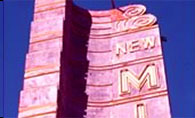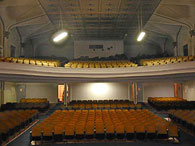
![]()
San Francisco has lost a great number of its classic movie theaters. Neighborhood and business communities have been working together with the City to devise ways to save and reuse those irreplacable buildings that have managed to survive. Elsewhere in the U.S. theaters once facing demolition have been restored to become tremendous assets to their communities, like Canton, Ohio's restored Palace Theater, and Columbus' magnificent Ohio Theater. Can San Francisco rise to the same challenge?
→ View a list of San Francisco movie house closings from 1978 to the present.
Listings are grouped by Art Houses and Repertory Cinemas, First Run Theaters, and Mission Street and Neighorbhood Theaters. Theater names now link to corresponding pages on the encyclopedic Cinema Treasures website providing historical background info for each theater, photos, mapping, as well as discussion threads that offer first-hand anecdotes about the lives of these theaters.
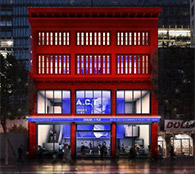
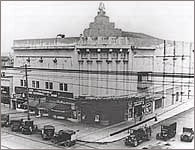
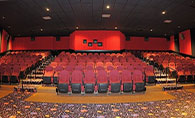
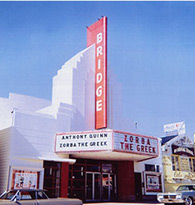
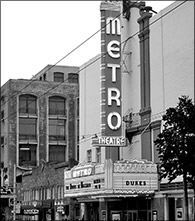
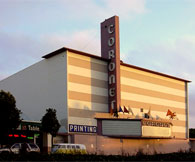
ABOVE: New Mission Theater, Strand Theater (rendering), Alexandria, Marina/Cinema 21, Harding Theater, Bridge, Metro Theater, Coronet
July 3, 2014: Preservationists and moviegoers alike look forward to Alamo Drafthouse's restoration of the New Mission Theater at 2550 Mission Street slated to open in 2015. More than a decade before, the theater had been targeted for demolition. Due to the persistent efforts of the Save the New Mission Theater group, The San Francisco Neighborhood Theater Foundation, and other preservationists, demolition plans came to a halt. See this site's New Mission Theater section for updates and information.
October 2, 2013: The American Conservatory Theater held its ground breaking for its renovation of the Strand Theater to play a center-stage part in San Francisco's revitalized Mid-Market area. View video coverage here. Purchased in 2012, A.C.T. intends to convert the theater to a 300-seat performing arts venue that includes a restaurant, classrooms and rehearsal space. Completion's projected for early 2015. Per artistic director Carey Perloff, "This is a great chance to have a small, more intimate space in which we can take the kinds of artistic risks on new material and young artists and new forms that are more challenging to do in a 1,000-seat theater." Pre-renovation photos of the Strand interior and more on the ground breaking event can be found here. See also Aaron Sankin's coverage of the plans for the Strand on SF Huffington Post.
April, 2013: SF Planning Dept. has approved Elevation Architect's designs for the Alexandria Theater. Built in 1923 by the celebrated Reid Brothers, the 2,000 seat showplace theater later became a three-screen theater in 1976, but closed in 2004. Per the SF Examiner, plans now call for one 221-seat single screen theater and a 7,000 sq. ft restaurant on the second floor. The first floor will be converted to commercial space, and the theater's adjacent parking lot is to become a mixed-use development with 37 units of housing and two levels of underground parking. In addition to historical background and coverage on Cinema Treasures, additional photos on the Alexandria can be found on the Western Neighborhood Project site. See also SFCurbed's coverage thread here. The Conditional Use Application can be read here (pdf).
San Francisco Neighborhood Theater Foundation successfully negotiated an agreement with the owner of Cinema 21 allowing for both Walgreens and a two-screen theater. Walgreens resides on the street-level floor, while the Marina Theater is now housed upstairs with a 264-seat theater as well as an 86-seat theater in the mezzanine area. A concerted neighborhood effort working with the San Francisco Neighborhood Theater Foundation was able to stop the impending loss of the theater in May 2002.
The Harding Theater, at Divisadero and Hayes, was sold to a condo developer intending to demolish this 1926 Reid single-screen theater, a film and live performance venue that featured vaudeville performances in its early days and live concerts from groups like The Grateful Dead in the 60s. However, local and citywide opposition bolstered by statewide protection of this historic property (CEQA) have halted plans for complete demolition or modifications to the building that would compromise its ability to be a viable theater. Formed in 2011, Neighbors Developing Divisadero continues its outreach to neighbors, investors, community groups, merchants, and local government officials to support a community-minded, collaborative, and financially sustainable plan to revitalize the Harding Theater. For on-site coverage of the Harding Theater go here.
December 12, 2012: On the heels of the Lumiere Theater's recent closure, Landmark Theaters announced that December 27 marks the final night of operation for its Bridge Theater. No details have been provided for the closure, or what may become of the Geary St. venue in operation since 1939. View the SF Examiner December 12 article here. See also photogapher Beth LaBerge's Flickr photostream coverage of the Bridge.
September 23, 2012: The Lumiere Theater that opened its California and Polk location in 1967 closes after a failure to reach a new lease with its landlord—a great loss for foreign and art filmlovers that this Landmark location has catered to. For additional information, go here.
Declared a landmark in 2009, The Metro Theater at 2055 Union Street closed in 2006. In February 2012, the Planning Commission approved a plan to seismically retrofit the theater, and convert the interior into a gym run by Equinox Fitness. Per SF Gate, "final plans for the former movie theater, approved earlier this year, include a retractable screen and the option to use the main area as an auditorium space that will be used for movie screenings, presentations, and the like up to 18 times per year."
The Coronet at 3575 Geary, one of San Francisco's largest theaters with 1,350 seats, and the theater that had premiered Star Wars and Bladerunner, closed March 17, 2005. Its owner, The Institute of Aging, a nonprofit health services provider, demolished the theater and adjacent parking lot in 2007, replacing the space with a 150-apartment, six-story senior care facility and campus for IOA. Details can be found here. See also Cinema Teasure's discussion thread and Coronet photos.
